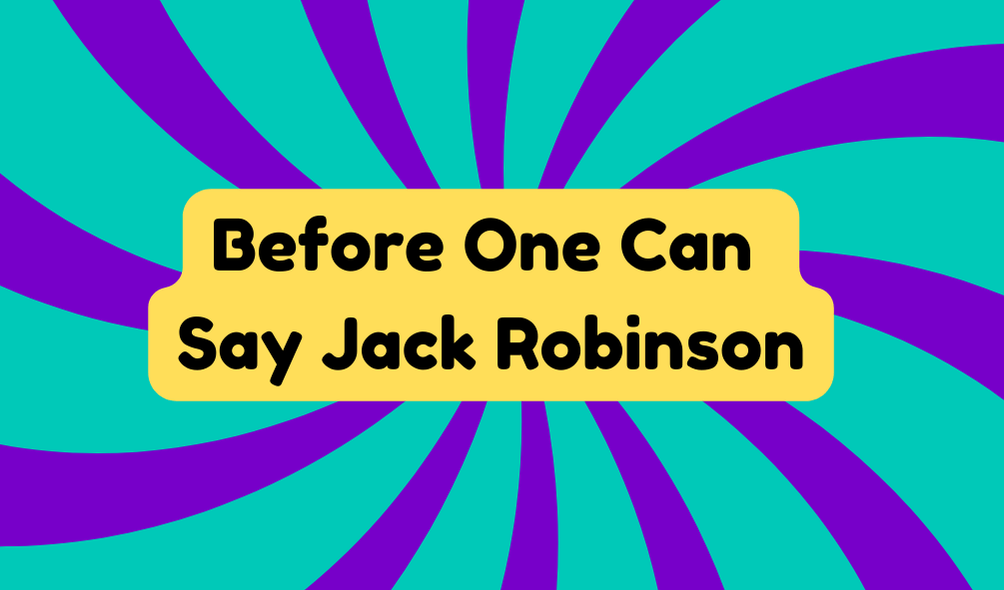"Before one can say Jack Robinson" is an idiom that emphasizes how swiftly events can occur. It suggests that change happens suddenly and with little warning. The phrase, tracing back to 1778, resonates in our fast-paced world, where timing often determines outcomes. While it adds flair to conversation, overusing it may lead to a cliché. Understanding its relevance and context allows for more effective communication. Discovering its origin highlights the evolution of language and expression.
Synonyms
When considering synonyms for the idiom "before one can say Jack Robinson," it is important to grasp the essence of the phrase, which conveys rapidity and surprise. This idiom resonates in contexts where a quick response or sudden departure occurs unexpectedly. Importantly, several alternatives capture this sentiment effectively:
- "In the blink of an eye"
- "At the drop of a hat"
- "Before you know it"
These phrases reflect similar moments of swift action or brief duration, urging readers to recognize that life can change in an instant, often catching individuals off guard and emphasizing the unpredictability of time.
Example of Sentences
The idiom "before one can say Jack Robinson" illustrates the striking unpredictability of events that can occur in a remarkably short span of time. It serves as a stark reminder of how quickly life can change, demanding quick responses or resulting in unexpected departures.
- A friend's sudden call led her to leave before one could say Jack Robinson.
- Plans for the weekend vanished as everyone's schedules shifted unexpectedly.
- The delivery arrived swiftly, transforming the day before anyone realized.
Such moments highlight the fleeting nature of opportunities and the necessity of adaptability in our fast-paced world.
Origin
The phrase "before one can say Jack Robinson" has an intriguing origin, intertwining both playful invention and historical context. Despite searching for a specific individual named Jack Robinson, none exist; rather, the phrase likely evolved from a fictional character. The usage can be traced back to 1778 in Madame Frances D'Arblay's novel, showcasing the intricacies of language evolution. This playful name encapsulates the swift and surprising nature of events, reflecting cultural tendencies toward brevity in expression. Ultimately, while the phrase entertains, it highlights how language adapts, illustrating the fascinating dynamics between societal experience and linguistic creativity.
Collocations
Collocations related to the phrase "before one can say Jack Robinson" reveal its flexibility in usage across different contexts. This expression enhances conversations by conveying unexpected speed or abruptness. Understanding effective collocations with "Jack Robinson" is essential for nuanced dialogue.
- "Left before one can say Jack Robinson"
- "Happened before one can say Jack Robinson"
- "Completed before one can say Jack Robinson"
These collocations illustrate how quickly events can unfold, enriching discussions. However, caution should be exercised; overusing this phrase may lead to ambiguity and weaken its impact in communication. Mastery lies in meaningful, context-driven usage.
How to Use in Everyday Language
Using idiomatic expressions like "before one can say Jack Robinson" can certainly add flair to conversations, but caution is warranted. While these everyday expressions can energize dialogue, their overuse may render them cliché, diminishing impact. Individuals should consider the context and audience when employing such idiomatic phrases. Equally important is understanding the phrase's meaning to avoid miscommunication. For example, using it to describe situations requiring urgency can be effective, but using it in unrelated contexts can confuse listeners. In advancing communication, innovation lies not only in word choice but also in maintaining clarity and relevance throughout the conversation.
Why Is It Still Relevant Today?
Is the phrase "before one can say Jack Robinson" still applicable in today's fast-paced world? In an era where timing importance is critical, this expression resonates more than ever. Unexpected events happen constantly, often leading to sudden changes in plans or outcomes. As innovations rapidly alter how we communicate and conduct business, the need for quick responsiveness becomes paramount. Consequently, this idiom serves as a reminder of the unpredictability inherent in life. Individuals and organizations alike must stay agile, ready to adapt before one can utter even a simple phrase, emphasizing that speed and adaptability are essential in contemporary circumstances.







